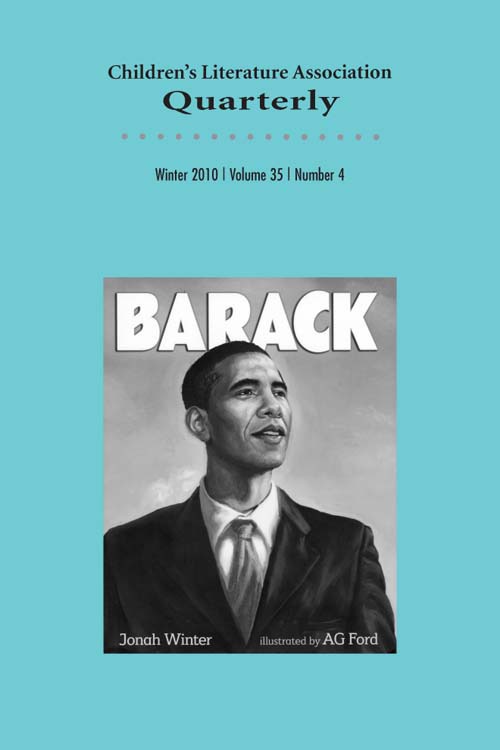The sequel (or prequel?) to “How to Publish Your Book,” here’s something else they don’t always teach you in graduate school. As in that earlier post, this is what has worked for me. Results may vary.
Please note: the advice below derives from my experience as an English professor who specializes in children’s literature. Â This advice will be most applicable to those in English/Modern Languages and, more generally, the Humanities. Â If you’re working within a different discipline, then please consult someone in that field.
1. How do I know when my article is ready to send out?
 The short answer is when it’s in the best possible shape it can be in.
The short answer is when it’s in the best possible shape it can be in.
The longer answer is if you’re not sure what that shape looks like, then seek help. If you’re an assistant professor or adjunct, then seek help from a colleague – at your current or former institution – or from a colleague you’ve met at a conference. If you’re a graduate student, ask a professor. Or ask a graduate student who’s already published something. Have people whose advice you trust – and whose writing you admire – critique the article. What works? What doesn’t? What isn’t clear? But don’t revise endlessly: Set yourself a deadline for revising it, make the essay as tightly focused and as clearly written as you can, and then send it out.
2. Where do I send my article?
 What journals cover the subject of your article? If you’re not sure, you might look at the journals you consulted during your research. You might also seek advice from someone else in the field – if you’re a graduate student, then perhaps from a professor. After you’ve a list of possibilities, read some articles in each journal and think about which would be the best fit. In the field of children’s literature, some journals you might consider include: Children’s Literature, The Lion and the Unicorn, The Children’s Literature Association Quarterly, Children’s Literature in Education, The New Review of Children’s Literature and Librarianship, and Jeunesse (formerly Canadian Children’s Literature). That’s by no means an exhaustive list. For a more complete (if decade-old) list, see Wally Hastings and Michael Joseph’s page of Journals that publish articles on children’s literature theory and criticism.
What journals cover the subject of your article? If you’re not sure, you might look at the journals you consulted during your research. You might also seek advice from someone else in the field – if you’re a graduate student, then perhaps from a professor. After you’ve a list of possibilities, read some articles in each journal and think about which would be the best fit. In the field of children’s literature, some journals you might consider include: Children’s Literature, The Lion and the Unicorn, The Children’s Literature Association Quarterly, Children’s Literature in Education, The New Review of Children’s Literature and Librarianship, and Jeunesse (formerly Canadian Children’s Literature). That’s by no means an exhaustive list. For a more complete (if decade-old) list, see Wally Hastings and Michael Joseph’s page of Journals that publish articles on children’s literature theory and criticism.
Two other general principles:
- Aim high and then settle. That is, if you think the article can be published in the top journal in your field, then send it there first. If that journal doesn’t like it, its editors will let you know. And you can move on to the next one.
- Publish widely and well. If this is your second (or third, fourth, etc.) article, consider sending it to a different journal. It’s a-OK to publish more than one piece in the same journal (especially if it’s a good one), but publishing in more than one place (especially good ones) shows that your work has been approved by multiple venues.
3. What does a cover letter look like?
Nearly all submissions happen on-line, so this is probably a cover email rather than a cover letter. Here’s my most recent one, sent to American Quarterly on 2 August 2010:
Dear Editors,
I am attaching “Was the Cat in the Hat Black?: Seuss and Race in the 1950s.” Â I’m also attaching a document containing images. Â I’ve read your guidelines concerning images, and — should the article meet the needs of American Quarterly — I will (of course) send hi-res scans and obtain all necessary permissions.
Should you have any questions about the manuscript (or the images), please don’t hesitate to contact me. Â Thank you.
Sincerely yours,
Philip Nel
[followed by full contact info.]
As you can see, the letter is brief and to the point.
4. The journal’s guidelines ask for Chicago citation style. I’ve used MLA style. Do I have to re-format my article?
Yes. Follow all of the journal’s guidelines, including suggested page length. It’s not that hard to switch from MLA to Chicago, or Chicago to MLA, or any of the other styles. It may not be especially exciting work, but it’s simple enough. Do it. And you may as well save a copy in your original citation format – just so you have it.
5. I’ve sent it in. Now what?
First, the journal should acknowledge receipt of your work. Generally, this happens within a week, perhaps even within a few days. If a month passes or even a couple of weeks pass without acknowledgment, then follow up. If more time than that passes, then follow up again. If you reach six weeks or so and there’s not yet been any acknowledgment, then write again, politely informing the journal that you have decided to submit your article elsewhere. Each time you correspond, you should include the record of your correspondence – easiest way to do this (in email) is by simply forwarding the earlier one each time, and appending your latest query to the top of the message.
You can, of course, wait longer than six weeks. Perhaps it’s a very prestigious journal, and you feel it’s worth the wait. That’s up to you. But the essay is your intellectual property, and it deserves to be treated with respect.
6. When should I expect to hear from the journal?
 Three to four months after it sends your article out for review. Some journals take longer, and some are more swift. On the longer side, American Quarterly now takes 6-8 months just to decide whether to send out the article to reviewers. On the shorter side, the editor of a special issue is most likely to offer the most prompt response. Indeed, the fastest way to get published in a journal is through a special issue: it allows you to bypass the journal’s backlog of unpublished articles.
Three to four months after it sends your article out for review. Some journals take longer, and some are more swift. On the longer side, American Quarterly now takes 6-8 months just to decide whether to send out the article to reviewers. On the shorter side, the editor of a special issue is most likely to offer the most prompt response. Indeed, the fastest way to get published in a journal is through a special issue: it allows you to bypass the journal’s backlog of unpublished articles.
If three months pass, and you’ve not yet heard from the journal, then follow up. Be polite and brief.
Dear [person at journal],
With apologies for bothering you at a busy time of the term, I thought I would follow up. Â Have you any sense of when we might receive readers’ reports on my manuscript?
Thanks in advance for any information you may have.
Best regards,
[your name, contact info., etc.]
The journal will then follow up with the reader(s). As a reader myself, I find these follow-up emails very helpful. I get overwhelmed with work, and I use urgency to bump this task up my to-do list. So, when I get a “where is the reader’s report?” email, I get right on it.
Two related points:
- You can withdraw your article. Depending on how tardy the response, you might decide to withdraw your article from consideration. When? That depends on how prestigious the journal is and how long you’re willing to wait. It’s reasonable to expect readers’ reports within three to six months time. This is your intellectual labor: if the journal isn’t treating it (and thus you) with sufficient respect, then take your submission elsewhere.
- One journal at a time. Very important: you must withdraw the article from consideration at Tardy Journal before submitting it to another journal. You’re not allowed to have the same article under consideration at more than one place.
In case you’re curious: yes, I have withdrawn work and submitted it elsewhere. In one case, I withdrew work from a proposed essay collection (the editors of which were not responding as swiftly as I’d liked) and submitted it to a journal’s special issue – where, in short order, the essay was published.
So. Be proactive!
7. I heard back from the journal! What do I do now?
That all depends on the response. There are four possible ones.
- Accepted. In this case, express your delight to the editor, make the (presumably minor) editorial and typographical changes you need to make, and do whatever you need to do to prepare the piece for publication. For example, are there images you wish to include? If so, start seeking permissions immediately – image permissions can take months to obtain. And, of course, update the entry on your CV to indicate “Forthcoming,” along with the article’s page length in manuscript form. And pat yourself on the back.
- Accepted with revisions. Make the revisions. Cede the point when you can, and hold your ground when you need to. But do your best to address the readers’ concerns. Accept the helpful advice with gratitude and respond graciously to the less helpful ones. Important: Respond onlyto the content and never to the tone. Sometimes, a reader’s report can be snarky or sarcastic or even cruel. This isn’t the norm, but it does happen. In those cases, remember that your objective is to publish this article. Viewing an obnoxious reader’s report as an invitation to verbal sparring may be emotionally satisfying for you, but it will not help you achieve your objective. So: don’t go there. Be professional. If you’re worried about your tone, have a friend or colleague read your note before sending.
- As you make revisions or after you complete them, you might consider creating a separate document in which you sketch a map of your changes. You don’t have to do this, and it may be that the cover letter will provide you enough space to indicate where changes have been made. But one thing I’ve done (though I do it much more rarely now than I used to) is indicate how I specifically responded to the reader’s suggestions by pointing out where, in my article, I made the changes.
- Revise and resubmit. If you get this response, you have two choices. If you feel that the reviewer is completely missing the point, then perhaps this isn’t the journal for you. Thank the editor, withdraw your piece and submit it elsewhere. More often than not, though, I’d advise you to pursue the other choice – revise and resubmit. If the reader has suggested that you revise and resubmit, then he or she sees some potential in your work… but your piece is just not yet where it needs to be. You will likely have to do some fairly extensive revisions – rewriting sections, throwing parts out, creating new parts. But you’ll learn something and, in the process, will improve your essay. See the “Accepted with revisions” guidelines above.
- Reject. Three choices. If you think the journal is wrong, then send the piece out to a different journal. Or, first, make a few revisions and then send the piece out a different venue. The first journal to which I sent “‘Said a Bird in the Midst of a Blitz…’: How World War II Created Dr. Seuss” rejected it – and took its time in doing so. I then sent the piece to Mosaic, where it appeared in a special issue. If the essay is important to you, your second option is to revise the piece and then submit it again – either to this journal or to another. The third option is to put it aside for now. Work on something else. Perhaps, in time, you’ll return to this piece, and be able to salvage what’s salvageable. Perhaps you won’t. But don’t fret too much about one article. You’ll write others. The main thing is that you learn why this one isn’t working so that you don’t repeat those mistakes in other essays.
8. How much do journals pay you?
In the Humanities, they don’t. If your work appears in an edited collection, then you should expect to receive a copy of the book. Again, though, getting paid for contributing is rare. If you’re writing an essay for a reference work, you’re likely to get paid but not get a copy of the book. That depends: sometimes I’ve been paid for those, and other times I just get a copy of the book. And “payment” is fairly loosely defined. “Payment” can be a certain $ amount of books from the publisher’s catalogue.
9. When will it appear in the journal?
As indicated above, if it’s in a special issue, then quite soon – as soon as a couple of months. But that’s the best-case scenario. More likely, your essay will not appear for at least a year. If the journal has a backlog of accepted essays, you may wait for several years. You can still mark the piece as “Forthcoming” on your CV, of course.
10. Geez. That seems like a lot of work just to get something published.
Yes, it does. But, as is the case with many things, the more you do it, the better you get at it. If this is something you want to achieve, then persist. To quote the Desmond Dekker song, “You can get it if you really want, but you must try, try and try, try and try… you’ll succeed at last.”

Anne
Pingback: What Do Professors Do All Day? « sarahpark.com
Martin de la Iglesia
Anna
Philip Nel
Anna
Debby
Philip Nel
Arun
Philip Nel
latifa
N. Sowmia Kumar
Roseann
Philip Nel
Pingback: How to Prepare Your Academic Dossier « sarahpark.com
Ioannis
Philip Nel
ioannis
Philip Nel
Anne
Philip Nel
Sandeep Annojwala
Hassan Raza
Philip Nel
amin
Philip Nel
Esther
Philip Nel
Nick Rowe
Philip Nel
June
Philip Nel
Kathleen
Philip Nel
Elisabeth Lore
Philip Nel
Anonymous
Philip Nel
Animaw Tadesse
Philip Nel
Connie
Philip Nel
Noor
Philip Nel
Enkay
Lena
Philip Nel
Shimshon
Philip Nel
fathi, Hjjat
Ariadne
Philip Nel
hanane hashemi
Shannon